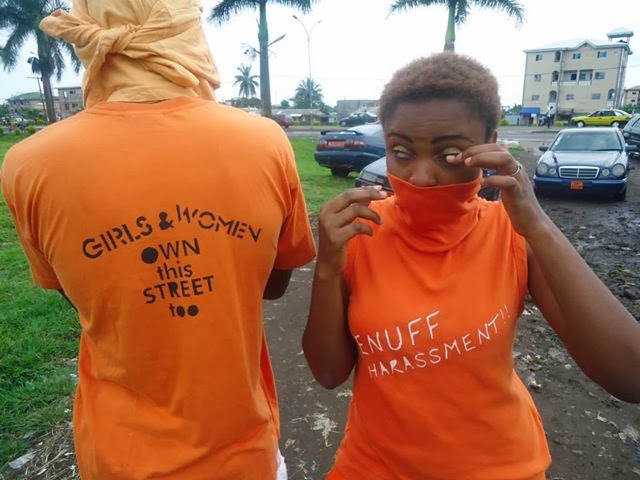By Zoneziwoh Mbondgulo, Buea, Cameroon, SSH Safe Public Spaces Mentee

Street harassment in this our area is real. Though often overlooked especially that of police officers who have now become more of perpetrators of harassment on girls and young women dressed in ‘shorts’ , leggings, topless blouse and/ or light cloths.
Some months ago, I wrote a blog post for Stop Street Harassment Mentorship Program on the different forms of street harassment faced by women and girls here in our community. In this my special edition, I wish to share my #OrangeDay report to draw your attention to three unique stories – there are a lot but I have chosen to share just these three– about street harassment – especially police harassment of girls and women based on dressing choice.
Yesterday, together with three friends, I joined the UN Women in celebration of the global #OrangeDay Campaign, where we did a SAFE CITIES WALK to raise awareness on street harassment and calling for SAFE CITIES FOR GIRLS & WOMEN.
The experience of yesterday was awesome. It was far more interesting than what I had initially imagined. At least, I felt more empowered and confident talking about harassment as we walked in a group, dressed in our uniform, that’s the Orange T-shirts (and trousers) and on each T-shirt was a message calling for SAFE SPACES for all, particularly women and girls. In total, we covered a distance of one mile.
While doing that, I observed so many things. First, the fact that those who read the message on our T-shirts engaged into debates. While some (bystanders, including our own friends) asked us what we meant by ‘harassment’, why we were wearing Orange, and who were harassing who? Moreover, whether ‘we think girls / women should be allowed to dress the way they do?”
Another interesting remark was that many of those (but for some few) who read the message made a comment – though not all were supportive.
Recollecting my yesterday experience, brings me back to the three unique stories I promised to share.
1. Two Sundays before celebrating this Orange day, I witnessed a young woman, probably within her twenties been bullied at the Molyko Junction by two police officers, simply because she had dressed in a short long sleeve gown. This lady was new in town and was just about to board a car to the bus station where she would take a bus to Douala, the economic capital of Cameroon. This, she said in her unrecorded statement to the police while on detention.
While at the police station, before later been ordered to leave the station, I had asked the officer on-service to show me where exactly in the law it is mentioned that girls shouldn’t dressed in ‘shorts’ and what parameters/ measurement tapes do they [as dressing police] use to measure what is ‘short’ and not.
This is the third time; I am at that same police station asking for the same clothing law which says what girls/women must and must not wear in public. I remember the first time I went there; they weren’t able to show me a piece of document. They referred me to Court. The following day, I went to Court and there I was referred to the governor’s office. And so on…till date—no office has provided me with any of the document they claim exists.
2. Some months ago, a boy also laid a complaint to my organization; Women For A Change, Cameroon (WFAC), how on his way home, one hot afternoon, a police officer stopped him, and began bullying at him, pulling him from his waist and dragging him on the unpaved road to a nearby bar in the quarters, and asking him to confess that he was gay. All these because he had dressed in short demi-jean and had long painted finger nails and a carved eyebrow.
3. Sometimes ago, I also recalled witnessing a young educated man, (sadly someone I know) bullied and threatened to pull down a girl’s skirt and spaghetti top. And when asked why he would even think of doing such a thing, he said: “The girl’s dressing was improper” “wearing short-tight fitted cloth on the street was not correct”, whereas, he forgot to realized that he too was wearing a swag trouser that stays under the buttocks and may also be seen as improper because his whole ASS was exposed.
There are many of such examples, many of which end up unreported and unaddressed, especially as those who are to bring justice have also become perpetrators.
I think we need to change our ways, get more serious and work for more progressive and development-oriented issues. And neither harassing nor detention of women and girls can get us there. These to me, are senseless and focus –less actions!
Updates on this project can be found at: Women for a Change- Cameroon, or via Twitter @zofem.

Lavon Mcdougal says
I really like it when folks come together and share ideas. Great website, stick with it!